英语七年级下册 Unit 7 It's raining! Section B(2a-SelfCheck)课件(共有PPT29张,含音频)
文档属性
| 名称 | 英语七年级下册 Unit 7 It's raining! Section B(2a-SelfCheck)课件(共有PPT29张,含音频) | 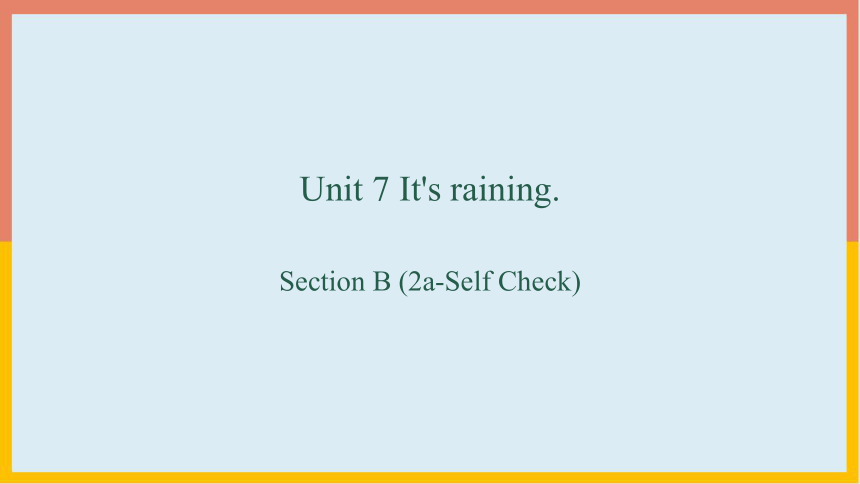 | |
| 格式 | zip | ||
| 文件大小 | 6.5MB | ||
| 资源类型 | 教案 | ||
| 版本资源 | 人教新目标(Go for it)版 | ||
| 科目 | 英语 | ||
| 更新时间 | 2022-01-01 19:27:17 | ||
图片预览

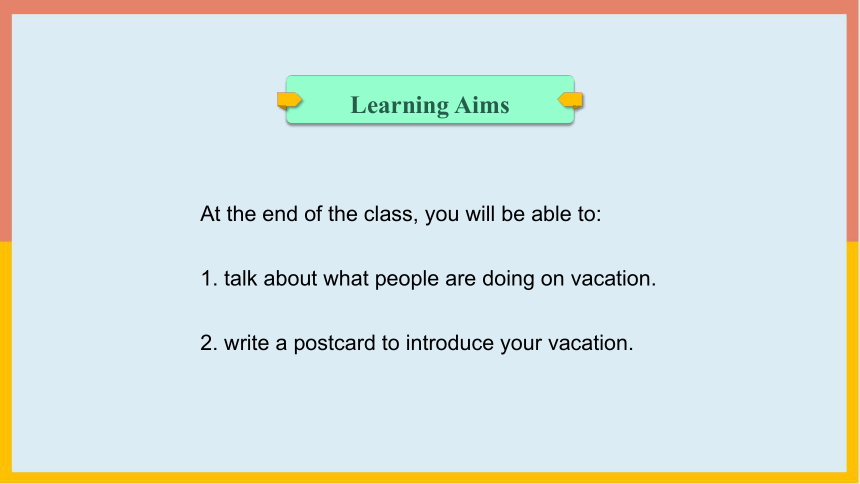
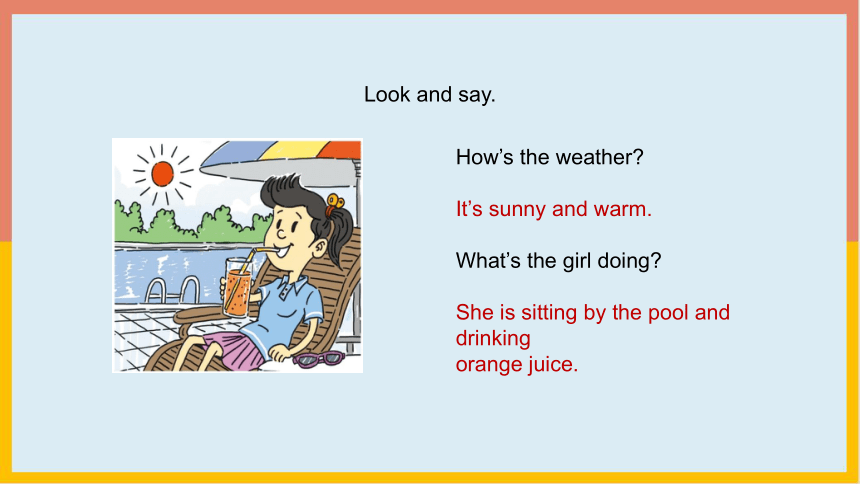
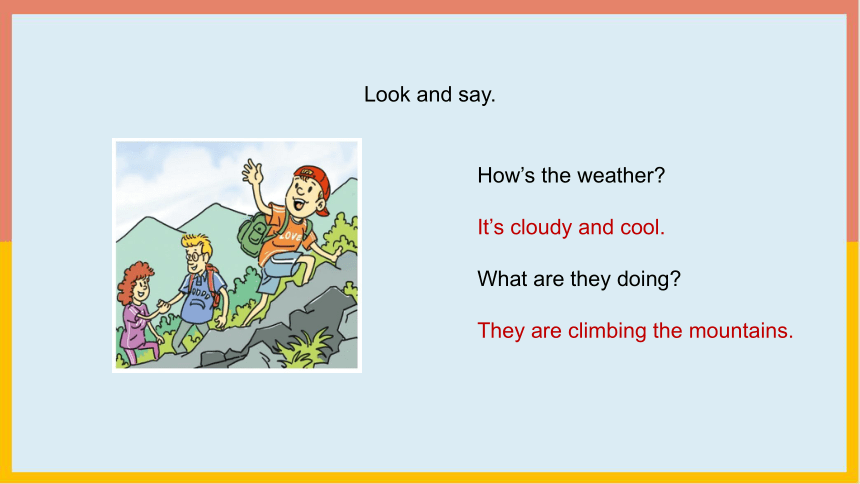
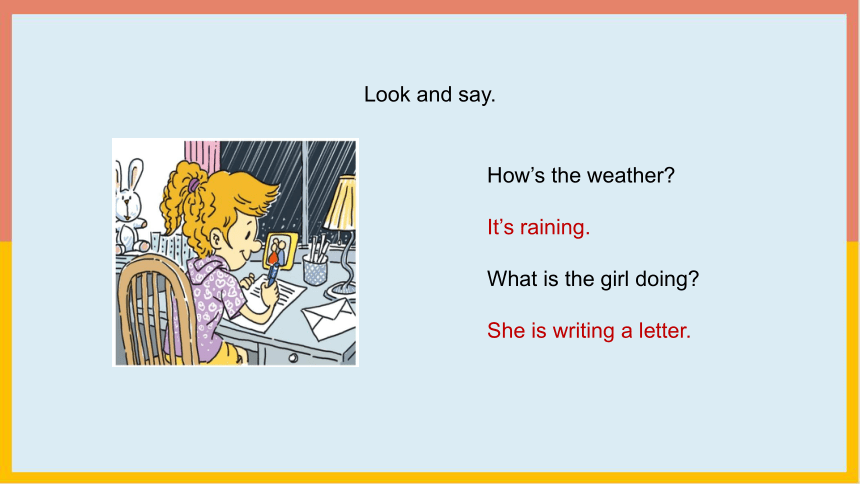
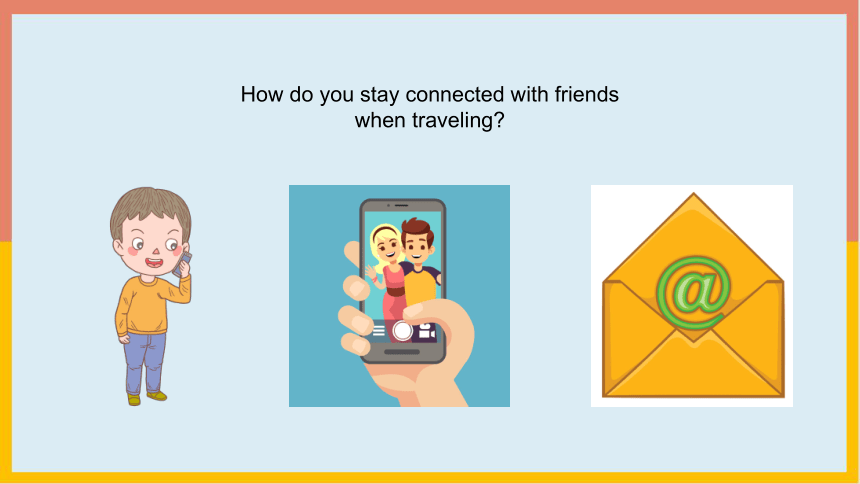
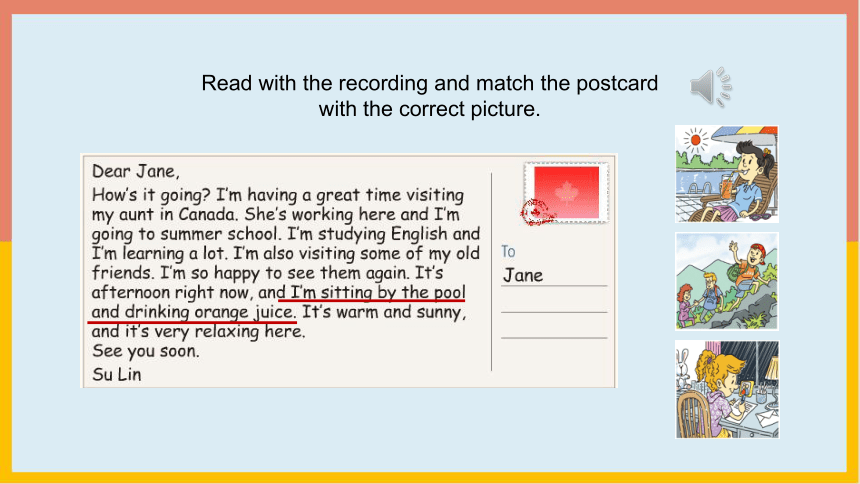
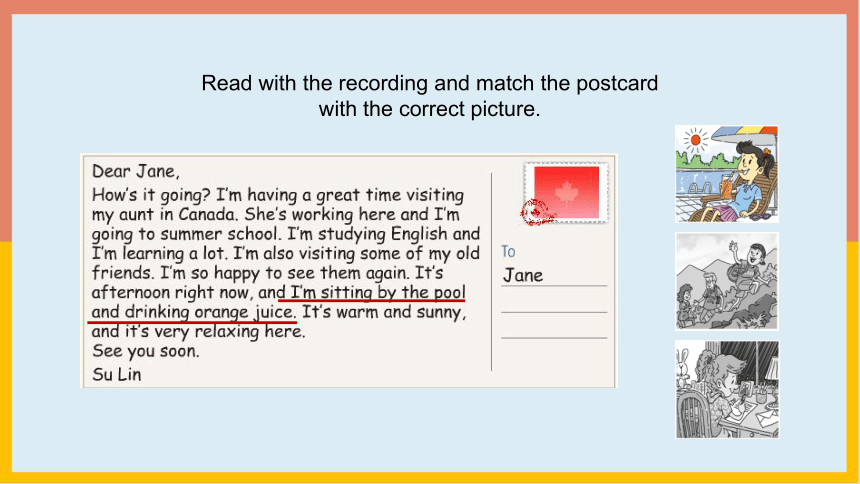
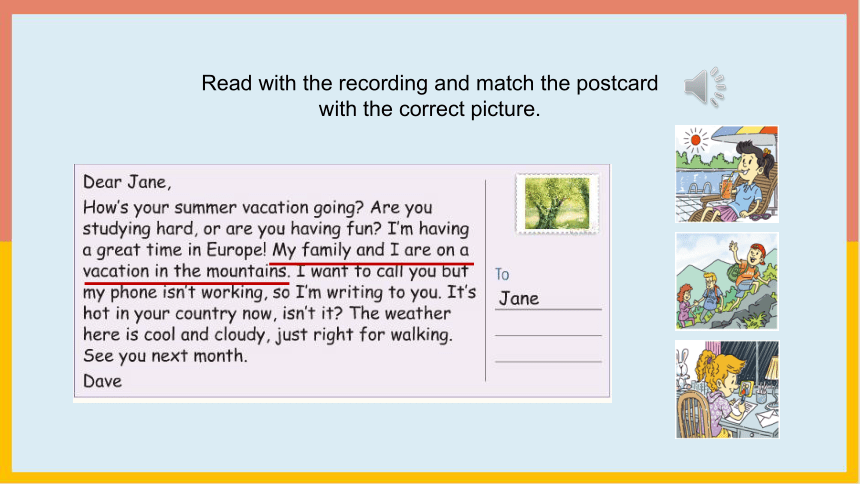
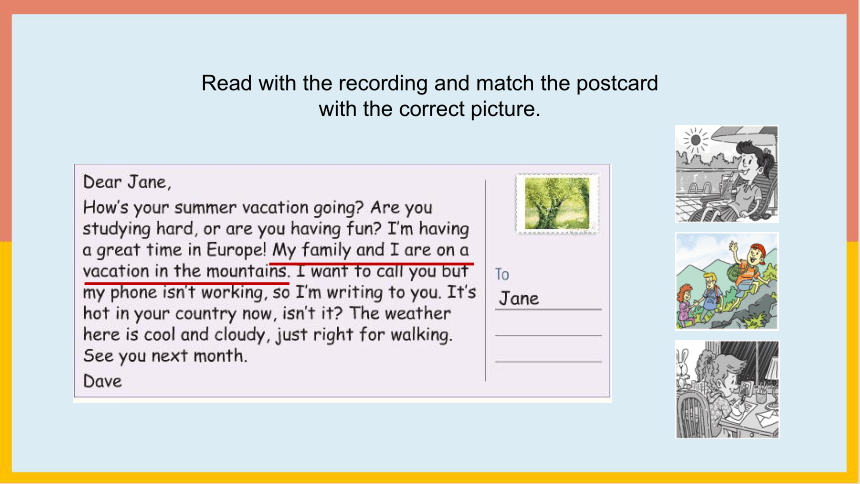
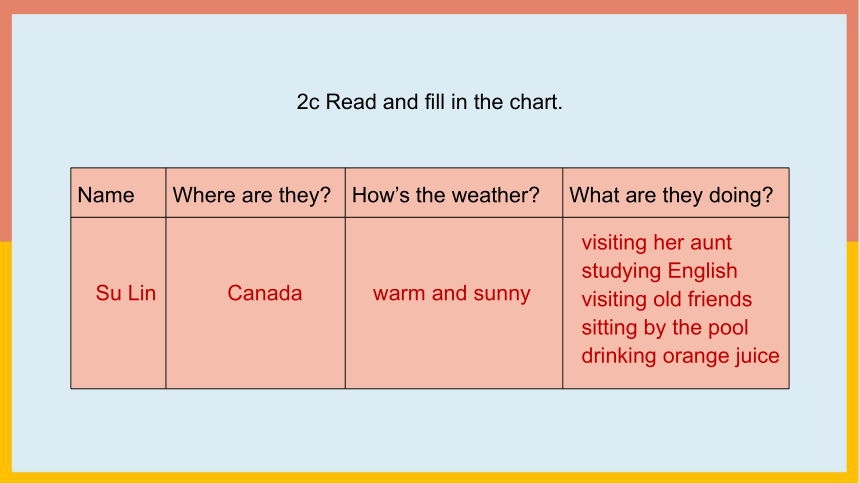
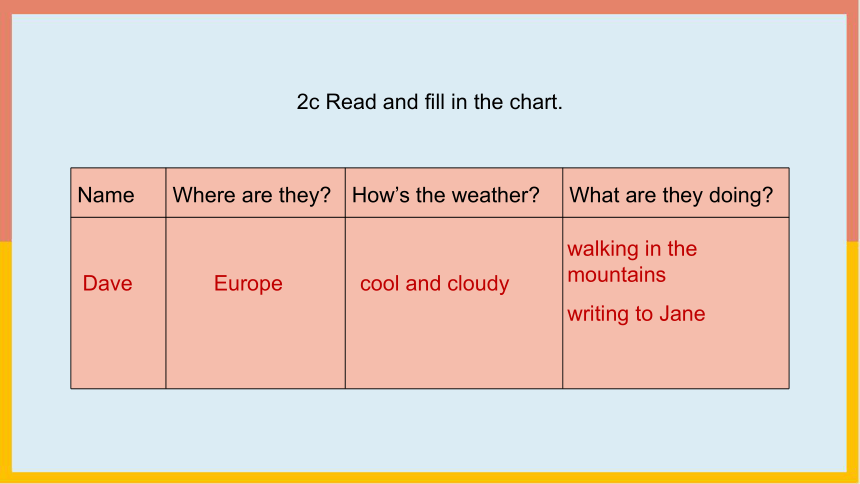
文档简介
(共49张PPT)
Unit 7 It's raining.
Section B (2a-Self Check)
Learning Aims
At the end of the class, you will be able to:
1. talk about what people are doing on vacation.
2. write a postcard to introduce your vacation.
Look and say.
How’s the weather
It’s sunny and warm.
What’s the girl doing
She is sitting by the pool and drinking
orange juice.
Look and say.
How’s the weather
It’s cloudy and cool.
What are they doing
They are climbing the mountains.
Look and say.
How’s the weather
It’s raining.
What is the girl doing
She is writing a letter.
How do you stay connected with friends when traveling
Read with the recording and match the postcard with the correct picture.
Read with the recording and match the postcard with the correct picture.
Read with the recording and match the postcard with the correct picture.
Read with the recording and match the postcard with the correct picture.
2c Read and fill in the chart.
Name Where are they How’s the weather What are they doing
Su Lin
Canada
warm and sunny
visiting her aunt
studying English
visiting old friends
sitting by the pool
drinking orange juice
2c Read and fill in the chart.
Name Where are they How’s the weather What are they doing
Dave
Europe
cool and cloudy
walking in the mountains
writing to Jane
How to write a postcard
称呼;收信人
结束语
写信人
内容
地址
I’m having a great time visiting my aunt in Canada.
我正在加拿大看望我的姑姑,我玩得很开心。
have a great/good time (in) doing sth.=have fun(in) doing sth.,意为“愉快地做某事”。
e.g.
Mike often has a great time playing games with his friends after school.
have a great/good/wonderful time
常用于情景交际中,表示祝愿,意为“祝您玩得快乐”。
e.g.
—I will go to the Great Wall tomorrow.
—Have a good time!
I’m having a great time visiting my aunt in Canada.
我正在加拿大看望我的姑姑,我玩得很开心。
visit作动词的用法
visit
意为“拜访;探望”,后跟表示人的名词或代词。
意为“参观;浏览”,后跟表示地点的名词。
1. visit也可作名词,意为“访问;参观; 拜访”,常构成短语:
play/make a visit to... 参观或访问……
be on a visit to... 正参观/访问……之中
go on a visit 去访问,去参观
2. visit+ or(人)→visitor 参观者;旅游者;游客
e.g.
There are many visitors in Hangzhou on National Day every year.
I’m so happy to see them again.
我很高兴再次看到他们。
be happy to do sth.意为“高兴做某事”,属于“be +adj.+ to do sth.”结构。
e.g.
He is happy to pass the test.
属于“be +adj.+to do sth.”结构的常见短语:
be sorry to do sth. 抱歉做某事
be glad to do sth. 高兴做某事
It’s afternoon right now, and I’m sitting by the pool and drinking orange juice.
现在是下午,我正坐在游泳池边喝着橙汁。
sit是动词,意为“坐”,反义词是stand,意思是“站起来”。
sit down意为“坐下”。
e.g.
Tom sits next to me.
【注意】sit的现在分词形式应该双写t,再加-ing,即sitting。
It’s afternoon right now, and I’m sitting by the pool and drinking orange juice.
现在是下午,我正坐在游泳池边喝着橙汁。
by介词,意为“在……旁边”。
e.g.
My grandpa’s pet dog is sitting by the door.
by用法小结:
by
“by+交通工具” 表示“乘……”
表示时间,意为“到……时候”
by oneself 意为“独自地”
by the way 顺便问一下;顺便说一下
by用法小结:
Mrs Brown usually goes to New York by plane.
My mother will come back by noon.
My aunt is learning English by herself.
By the way, what time is it
Are you studying hard, or are you having fun
你正在努力学习,还是在高兴玩耍
hard此处作副词,意为“努力地;辛苦地”。
e.g.
I must work hard to pass the exam.
1. hard作副词,意为“猛烈地;沉重地”,=heavily。
e.g.
It’s raining hard but we get there on time.
2. hard作形容词,意为“困难的;坚硬的;艰难的”。
hard
adj. 困难的
adv. 努力地
adj. 坚硬的
adv. 猛烈地
Are you studying hard, or are you having fun
你正在努力学习,还是在高兴玩耍
have fun“玩得开心;过得愉快”,
常见的搭配有:
have fun with sb. 和某人玩得开心/过得愉快
have fun doing sth. 做某事感到有乐趣
My family and I are on a vacation in the mountains.
我和我的家人正在山里度假。
on a vacation意为“在度假”,还可表达为on vacation。
vacation的相关短语还有:
go on a vacation 去度假
take a vacation 度假
summer/winter vacation 暑假/寒假
I want to call you but my phone isn’t working, so I’m writing to you.
我想给你打电话,但我的电话坏了,所以我正给你写信。
work此处为不及物动词,意为“运转;运行;工作”。
若用于否定句中,多表示某物件“坏了”或“不运作了”。
e.g.
Her bike doesn’t work. So she has to walk to school.
I want to call you but my phone isn’t working, so I’m writing to you.
我想给你打电话,但我的电话坏了,所以我正给你写信。
write to sb.=write a letter to sb.意为“给某人写信”;
表示“收到某人的来信”用hear from sb.或get a letter from sb.表示。
e.g.
I’m really happy to hear from you.
It’s hot in your country now, isn’t it
你们国家现在很热,对吗
country是可数名词,意为“国;国家”,其复数形式为countries。
e.g.
China is a beautiful country.
country还可以意为“乡村,乡下”,=countryside。
e.g.
My grandparents live in the country.
It’s hot in your country now, isn’t it
你们国家现在很热,对吗
本句是一个反意疑问句,表示提出情况或看法,问对方是否同意。
反意疑问句由“陈述句+简略疑问句”两部分组成,常分为两类:
1.前肯后否型:肯定陈述句+否定疑问句
e.g. Your new friend is from Australia, isn’t she
The little boy likes ice-cream very much, doesn’t he
2.前否后肯型:否定陈述句+肯定疑问句
e.g.
Mary can’t play the violin, can she
Your parents aren’t at home, are they
【注意】反意疑问句前后两部分的人称、数和时态要一致,疑问句中要用代词,不能用名词。
3a Fill in the blanks with the words in the box.
skating
buying
playing
taking
snowy
windy
snowy
windy
buying
playing
skating
taking
Friends are buying Russian bread to take home. 朋友们正在买俄罗斯面包带回家。
Russian是形容词,意为“俄罗斯的”。
e.g.
My sister likes Russian salad very much.
Russian 可数名词 俄罗斯人
不可数名词 俄语
Russia 名词 俄罗斯
e.g.
The young man is a Russian. He is from Russia and he can speak Russian.
Image you are on a vacation.
Where are you
What’s the weather like
Who are you with
What are you doing
Are you having a good time
Write notes about your imaginary vacation.
Where are you
What’s the weather like
Who are you with
What are you doing
Are you having a good time
I’m in Australia.
It’s sunny and warm.
I am with my parents.
We are having a picnic.
Yes, we are.
Write a postcard according to your notes.
Dear Mike,
How’s it going I am on a vacation with my parents in Australia. We are having a wonderful time here. Australia is a beautiful country and the weather is warm and sunny. There are many things to do here. Right now we are having a picnic on the grass. It is really relaxing.
See you soon.
Wendy
Self check
1 Add more words in each box.
Activities: playing ping-pong _______________
__________________________________________________________________________________________
going to the movie, visiting my aunt, drinking orange juice, swimming, reading a newspaper
playing baseball
2 Match the sentences on the left with the responses on the right.
A: Hello Jenny speaking.
A: Sorry, she’s not at home.
Can I take a message
A: Sure, no problem.
B: Thank you. Bye.
B: Hi, Jenny. It’s Steve here.
May I speak to Laura, please
B: Yes. Could you ask her to call me at
8765-4321
Self check
3 Put these sentences in order to make a conversation. Then write your own conversation.
Self check
____ It’s raining and very cool.
____ What are you doing in the rainy weather
____ Not too bad.
____ How’s the weather in NanJing
____ I’m reading a book in my room.
____ Hi, Jill! How’s it going
1
2
3
4
5
6
1.Talk about the weather;
2.Talk about what people are doing;
3.How to write a postcard.
单项选择
( )1.I’m very happy you again.
A. meet B. to meet C. meeting D. meets
( )2.My cousin and his friends are a vacation in Beijing.
A. in B. on C. at D. of
( )3.We have to finish the work now,
A. don’t we B. haven’t we C. have we D. do we
B
B
A
单项选择
( )4.Look! It’s raining outside, so stay at home and don’t go out.
A. hardly B. hard C. heavy D. big
( )5.I had a great time football after school.
A. played B. playing C. play D. to play
B
B
根据汉语意思完成句子
1. I am having a good time _________ ________ ________ (看望我的叔叔) in Canada.
2. My parents are ________ ________ (喝果汁).
3. We are ________ ________ ___________ in the ___________ (在山里度假).
4. I am sitting ________ ________ ___________ ________ (在泳池旁).
5. The weather here is ________ ________ ________ (凉爽而且多云).
visiting my uncle
drinking juice
on a vacation mountains
by the swimming pool
cool and cloudy
根据汉语意思和所给的提示词翻译句子
1. 哈尔滨的冬天很寒冷。(it, in)
____________________________________________
2. 孩子们正玩雪玩得开心。(great, playing)
______________________________________________
3. 一些男孩正在游泳池游泳。(pool)
____________________________________________
It’s very cold in winter in Harbin.
The children are having a great time playing with snow.
Some boys are swimming in the pool.
根据汉语意思和所给的提示词翻译句子
4. 你和你的朋友们正在做什么?(and)
______________________________________________
5. 我能给他捎个口信吗?(take, for)
______________________________________________
What are you and your friends doing
Can I take a message for him
1. Read postcards and try to retell them.
2. Write a postcard to your friend.
Unit 7 It's raining.
Section B (2a-Self Check)
Learning Aims
At the end of the class, you will be able to:
1. talk about what people are doing on vacation.
2. write a postcard to introduce your vacation.
Look and say.
How’s the weather
It’s sunny and warm.
What’s the girl doing
She is sitting by the pool and drinking
orange juice.
Look and say.
How’s the weather
It’s cloudy and cool.
What are they doing
They are climbing the mountains.
Look and say.
How’s the weather
It’s raining.
What is the girl doing
She is writing a letter.
How do you stay connected with friends when traveling
Read with the recording and match the postcard with the correct picture.
Read with the recording and match the postcard with the correct picture.
Read with the recording and match the postcard with the correct picture.
Read with the recording and match the postcard with the correct picture.
2c Read and fill in the chart.
Name Where are they How’s the weather What are they doing
Su Lin
Canada
warm and sunny
visiting her aunt
studying English
visiting old friends
sitting by the pool
drinking orange juice
2c Read and fill in the chart.
Name Where are they How’s the weather What are they doing
Dave
Europe
cool and cloudy
walking in the mountains
writing to Jane
How to write a postcard
称呼;收信人
结束语
写信人
内容
地址
I’m having a great time visiting my aunt in Canada.
我正在加拿大看望我的姑姑,我玩得很开心。
have a great/good time (in) doing sth.=have fun(in) doing sth.,意为“愉快地做某事”。
e.g.
Mike often has a great time playing games with his friends after school.
have a great/good/wonderful time
常用于情景交际中,表示祝愿,意为“祝您玩得快乐”。
e.g.
—I will go to the Great Wall tomorrow.
—Have a good time!
I’m having a great time visiting my aunt in Canada.
我正在加拿大看望我的姑姑,我玩得很开心。
visit作动词的用法
visit
意为“拜访;探望”,后跟表示人的名词或代词。
意为“参观;浏览”,后跟表示地点的名词。
1. visit也可作名词,意为“访问;参观; 拜访”,常构成短语:
play/make a visit to... 参观或访问……
be on a visit to... 正参观/访问……之中
go on a visit 去访问,去参观
2. visit+ or(人)→visitor 参观者;旅游者;游客
e.g.
There are many visitors in Hangzhou on National Day every year.
I’m so happy to see them again.
我很高兴再次看到他们。
be happy to do sth.意为“高兴做某事”,属于“be +adj.+ to do sth.”结构。
e.g.
He is happy to pass the test.
属于“be +adj.+to do sth.”结构的常见短语:
be sorry to do sth. 抱歉做某事
be glad to do sth. 高兴做某事
It’s afternoon right now, and I’m sitting by the pool and drinking orange juice.
现在是下午,我正坐在游泳池边喝着橙汁。
sit是动词,意为“坐”,反义词是stand,意思是“站起来”。
sit down意为“坐下”。
e.g.
Tom sits next to me.
【注意】sit的现在分词形式应该双写t,再加-ing,即sitting。
It’s afternoon right now, and I’m sitting by the pool and drinking orange juice.
现在是下午,我正坐在游泳池边喝着橙汁。
by介词,意为“在……旁边”。
e.g.
My grandpa’s pet dog is sitting by the door.
by用法小结:
by
“by+交通工具” 表示“乘……”
表示时间,意为“到……时候”
by oneself 意为“独自地”
by the way 顺便问一下;顺便说一下
by用法小结:
Mrs Brown usually goes to New York by plane.
My mother will come back by noon.
My aunt is learning English by herself.
By the way, what time is it
Are you studying hard, or are you having fun
你正在努力学习,还是在高兴玩耍
hard此处作副词,意为“努力地;辛苦地”。
e.g.
I must work hard to pass the exam.
1. hard作副词,意为“猛烈地;沉重地”,=heavily。
e.g.
It’s raining hard but we get there on time.
2. hard作形容词,意为“困难的;坚硬的;艰难的”。
hard
adj. 困难的
adv. 努力地
adj. 坚硬的
adv. 猛烈地
Are you studying hard, or are you having fun
你正在努力学习,还是在高兴玩耍
have fun“玩得开心;过得愉快”,
常见的搭配有:
have fun with sb. 和某人玩得开心/过得愉快
have fun doing sth. 做某事感到有乐趣
My family and I are on a vacation in the mountains.
我和我的家人正在山里度假。
on a vacation意为“在度假”,还可表达为on vacation。
vacation的相关短语还有:
go on a vacation 去度假
take a vacation 度假
summer/winter vacation 暑假/寒假
I want to call you but my phone isn’t working, so I’m writing to you.
我想给你打电话,但我的电话坏了,所以我正给你写信。
work此处为不及物动词,意为“运转;运行;工作”。
若用于否定句中,多表示某物件“坏了”或“不运作了”。
e.g.
Her bike doesn’t work. So she has to walk to school.
I want to call you but my phone isn’t working, so I’m writing to you.
我想给你打电话,但我的电话坏了,所以我正给你写信。
write to sb.=write a letter to sb.意为“给某人写信”;
表示“收到某人的来信”用hear from sb.或get a letter from sb.表示。
e.g.
I’m really happy to hear from you.
It’s hot in your country now, isn’t it
你们国家现在很热,对吗
country是可数名词,意为“国;国家”,其复数形式为countries。
e.g.
China is a beautiful country.
country还可以意为“乡村,乡下”,=countryside。
e.g.
My grandparents live in the country.
It’s hot in your country now, isn’t it
你们国家现在很热,对吗
本句是一个反意疑问句,表示提出情况或看法,问对方是否同意。
反意疑问句由“陈述句+简略疑问句”两部分组成,常分为两类:
1.前肯后否型:肯定陈述句+否定疑问句
e.g. Your new friend is from Australia, isn’t she
The little boy likes ice-cream very much, doesn’t he
2.前否后肯型:否定陈述句+肯定疑问句
e.g.
Mary can’t play the violin, can she
Your parents aren’t at home, are they
【注意】反意疑问句前后两部分的人称、数和时态要一致,疑问句中要用代词,不能用名词。
3a Fill in the blanks with the words in the box.
skating
buying
playing
taking
snowy
windy
snowy
windy
buying
playing
skating
taking
Friends are buying Russian bread to take home. 朋友们正在买俄罗斯面包带回家。
Russian是形容词,意为“俄罗斯的”。
e.g.
My sister likes Russian salad very much.
Russian 可数名词 俄罗斯人
不可数名词 俄语
Russia 名词 俄罗斯
e.g.
The young man is a Russian. He is from Russia and he can speak Russian.
Image you are on a vacation.
Where are you
What’s the weather like
Who are you with
What are you doing
Are you having a good time
Write notes about your imaginary vacation.
Where are you
What’s the weather like
Who are you with
What are you doing
Are you having a good time
I’m in Australia.
It’s sunny and warm.
I am with my parents.
We are having a picnic.
Yes, we are.
Write a postcard according to your notes.
Dear Mike,
How’s it going I am on a vacation with my parents in Australia. We are having a wonderful time here. Australia is a beautiful country and the weather is warm and sunny. There are many things to do here. Right now we are having a picnic on the grass. It is really relaxing.
See you soon.
Wendy
Self check
1 Add more words in each box.
Activities: playing ping-pong _______________
__________________________________________________________________________________________
going to the movie, visiting my aunt, drinking orange juice, swimming, reading a newspaper
playing baseball
2 Match the sentences on the left with the responses on the right.
A: Hello Jenny speaking.
A: Sorry, she’s not at home.
Can I take a message
A: Sure, no problem.
B: Thank you. Bye.
B: Hi, Jenny. It’s Steve here.
May I speak to Laura, please
B: Yes. Could you ask her to call me at
8765-4321
Self check
3 Put these sentences in order to make a conversation. Then write your own conversation.
Self check
____ It’s raining and very cool.
____ What are you doing in the rainy weather
____ Not too bad.
____ How’s the weather in NanJing
____ I’m reading a book in my room.
____ Hi, Jill! How’s it going
1
2
3
4
5
6
1.Talk about the weather;
2.Talk about what people are doing;
3.How to write a postcard.
单项选择
( )1.I’m very happy you again.
A. meet B. to meet C. meeting D. meets
( )2.My cousin and his friends are a vacation in Beijing.
A. in B. on C. at D. of
( )3.We have to finish the work now,
A. don’t we B. haven’t we C. have we D. do we
B
B
A
单项选择
( )4.Look! It’s raining outside, so stay at home and don’t go out.
A. hardly B. hard C. heavy D. big
( )5.I had a great time football after school.
A. played B. playing C. play D. to play
B
B
根据汉语意思完成句子
1. I am having a good time _________ ________ ________ (看望我的叔叔) in Canada.
2. My parents are ________ ________ (喝果汁).
3. We are ________ ________ ___________ in the ___________ (在山里度假).
4. I am sitting ________ ________ ___________ ________ (在泳池旁).
5. The weather here is ________ ________ ________ (凉爽而且多云).
visiting my uncle
drinking juice
on a vacation mountains
by the swimming pool
cool and cloudy
根据汉语意思和所给的提示词翻译句子
1. 哈尔滨的冬天很寒冷。(it, in)
____________________________________________
2. 孩子们正玩雪玩得开心。(great, playing)
______________________________________________
3. 一些男孩正在游泳池游泳。(pool)
____________________________________________
It’s very cold in winter in Harbin.
The children are having a great time playing with snow.
Some boys are swimming in the pool.
根据汉语意思和所给的提示词翻译句子
4. 你和你的朋友们正在做什么?(and)
______________________________________________
5. 我能给他捎个口信吗?(take, for)
______________________________________________
What are you and your friends doing
Can I take a message for him
1. Read postcards and try to retell them.
2. Write a postcard to your friend.
同课章节目录
- Unit 1 Can you play the guitar?
- Section A
- Section B
- Unit 2 What time do you go to school?
- Section A
- Section B
- Unit 3 How do you get to school?
- Section A
- Section B
- Unit 4 Don't eat in class.
- Section A
- Section B
- Unit 5 Why do you like pandas?
- Section A
- Section B
- Unit 6 I'm watching TV.
- Section A
- Section B
- Review of Units 1-6
- Unit 7 It's raining!
- Section A
- Section B
- Unit 8 Is there a post office near here?
- Section A
- Section B
- Unit 9 What does he look like?
- Section A
- Section B
- Unit 10 I'd like some noodles.
- Section A
- Section B
- Unit 11 How was your school trip?
- Section A
- Section B
- Unit 12 What did you do last weekend?
- Section A
- Section B
